Collaborative Research Centers
Collaborative Research Centers

Boron-containing molecules have such diverse properties that they are particularly interesting for materials science, medicine and pharmacy. Functional materials with boron as a property-determining element can be used for energy technology and optoelectronics, among other things.
- Electrolytes for batteries and supercapacitors as well as materials for organic light-emitting diodes are being researched as part of BORONPro.
- Another field of application is chemical synthesis: here the focus is on the development of boron-based catalysts for the efficient and resource-saving and therefore sustainable production of fine chemicals.
- The third area is biomolecules containing boron. The focus here is on potential applications in medical diagnostics and drug delivery, where the element boron offers novel and promising possibilities.
Location: Würzburg
Speaker: Prof. Dr. Maik Finze (Faculty of Chemistry and Pharmacy)
Duration: from 2026
Further information can be found here.
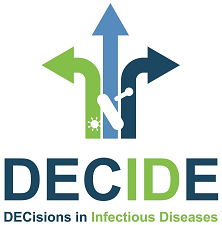
Infectious diseases are a major cause of suffering, morbidity and mortality worldwide. In particular, the worldwide increase of multidrug-resistant pathogens and the constant emergence of new human pathogens pose immense challenges to modern medicine. The Collaborative Research Centre 1583 "Decisions in Infectious Diseases" aims to identify molecular mechanisms within the host that control the course of infectious diseases. In particular it focuses on key decisions, which determine the clinical outcome of human infections.
Location: Würzburg
Speaker: Prof. Dr. Thomas Rudel (Faculty of Biology)
Duration: since 2023
Further information can be found here.
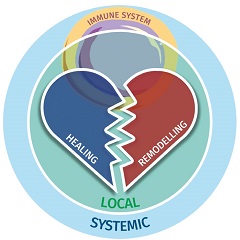
The latest research on myocardial diseases shows that inflammatory and immunological mechanisms influence the performance of the heart. Depending on the context and time, for example in the case of a heart attack, they can have both positive and negative effects. The Collaborative Research Center 1525 "Cardio-immune Interfaces" wants to elucidate the interactions between these mechanisms and heart diseases and thus create the basis for new therapies.
Location: Würzburg
Speaker: Prof. Dr. Stefan Frantz (Faculty of Medicine)
Duration: since 2022
Further information can be found here.
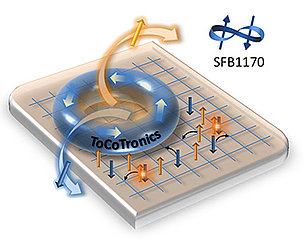
The SFB 1170 "Topological and Correlated Electronics at Surfaces and Interfaces" combines two of the most active and interesting research fields in modern solid state physics: topological phases and strong electronic correlations.
Location: Würzburg
Speaker: Prof. Dr. Björn Trauzettel (Faculty of Physics and Astronomy)
Duration: since 2015
Further information can be found here.
CRC/Transregio (TRR)

Desmosomes are at the centre of the CRC. These protein structures connect cells at interfaces in the body in such a way that a barrier is created. Functioning barriers in the skin and intestines are vital, meaning that serious diseases can develop if they malfunction.
The researchers are focussing on three diseases: The autoimmune disease Pemphigus vulgaris. It occurs when the body's own immune cells mistakenly attack desmosomes in the skin. The discovery that desmosomes also play a role in inflammatory bowel diseases was made in Würzburg, among other places. The researchers are also focusing on inflammation of the oesophagus(eosinophilic oesophagitis), in the development of which mutations of desmosomes are involved.
Locations: Marburg, Munich, Würzburg
Speaker: Prof. Dr. Michael Hertl (Universität Marburg)
Speaker in Würzburg: Univ.-Prof. Dr. Nicolas Schlegel (Faculty of Medicine)
Duration: from 2026
Further information can be found here.
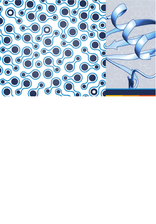
Despite the success of targeted therapies and the advent of immune therapies, cancer remains one of the most common cause of death. The exploration of fundamentally new therapeutic approaches is therefore urgently needed. The long-term goal driving this interdisciplinary CRC/TRR 387 is to deliver a foundation for novel treatment strategies based on a mechanistic understanding of aberrant ubiquitin dependent processes in defined tumor entities.
Locations: Frankfurt, Munich, Würzburg
Speaker: Prof. Dr. med. Florian Bassermann (TU Munich)
Duration: 07/2025 - 06/2028
Further information can be found here.

Adoptive T-cell therapy represents a promising, rapidly developing field of translational medical research. The Collaborative Research Center/Transregio 338 "LETSIMMUN", which is jointly funded by the TU Munich, the LMU Munich and the JMU, wants to be a national hot spot for the most modern basic and translational research in the field of "lymphocyte engineering" and aims to provide novel concepts and cell products for clinical development that offer therapeutic synthetic immunity for patients.
Locations: Munich, Würzburg
Speaker: Prof. Dr. Dirk Busch (TU Munich)
Speaker in Würzburg: Prof. Dr. Hermann Einsele (Faculty of Medicine)
Duration: since 2021
Further information can be found here.

The aim of the CRC/TRR 295, which is jointly run by the Charité Berlin and the JMU, is to understand the diverse symptoms of motor network diseases by characterizing symptom-specific network activity and to use these findings for the development of innovative neuromodulation strategies for the therapy of common and clinically relevant movement disorders.
Locations: Berlin, Würzburg
Speaker: Prof. Dr. Andrea Kühn (Charité Berlin)
Speaker in Würzburg: Prof. Dr. Jens Volkmann (Faculty of Medicine)
Duration: since 2020
Further information can be found here.
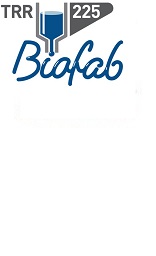
The objective of CRC/TRR 225 are investigations into the basics of biofabrication and its systematic use, with the aim of generating functional human tissue models (12-year perspective). Based on the available expertise at the participating locations in the field of biofabrication, the aim is to create with the CRC/TRR 225 and complementary state funding (Bavarian Polymer Institute) a sustainable competence center with a leading international role.
Locations: Würzburg, Bayreuth, Erlangen
Speaker: Prof. Dr. Jürgen Groll (Faculty of Medicine)
Duration: since 2018
Further information can be found here.

Within the Collaborative Research Center/Transregio 221, physicians and scientists from the Universities of Regensburg, Erlangen-Nuremberg and Würzburg as well as their respective university hospitals are aiming to find ways to make allogeneic stem cell transplantation safer and more successful in the future by avoiding disease relapses and reducing transplantation complications.
Locations: Regensburg, Erlangen, Würzburg
Speaker: Prof. Dr. Wolfgang Heer (Universität Regensburg)
Speaker in Würzburg: Prof. Dr. Hermann Einsele (Faculty of Medicine)
Duration: since 2018
Further information can be found here.

The CRC/TRR 205 unites several institutes in Dresden, Munich and Würzburg, with the aim to investigate the fundamental role of the adrenal gland in functional disorders, tumors and systemic diseases. The development of new diagnostic and therapeutic strategies for the treatment of adrenal gland diseases and the associated frequent stress-related diseases is of great importance for the well-being of the individual patient as well as for society as a whole.
Locations: Dresden, Munich, Würzburg
Speaker: Prof. Dr. Stefan R. Bornstein (Technische Universität Dresden)
Speaker in Würzburg: Prof. Dr. Martin Fassnacht (Faculty of Medicine)
Duration: since 2017
Further information can be found here.
Collaborative Research Centers with participation of JMU
Among childhood cancers, neuroblastoma is the third most common type of malignant tumour. Due to therapy resistance and early metastasis, relapses are frequent and the mortality rate is therefore high. According to the latest molecular findings, this is due to the unusually complex process of tumour development – and there are many non-genetic causes. Against this background, the goal of the CRC 1588 is to analyse the tumour’s own mechanisms, decode signalling pathways and clarify how the interactions of tumour cells with their micro- and macro-environment contribute to evolution. In this way, the aim is to improve individual treatment strategies in the long term.
Locations: Berlin, Würzburg
Speaker: Prof. Dr. Markus Bohnsack (Charité - Universitätsmedizin Berlin)
Duration: since 2023
Further information can be found here.
The synthesis of cellular ribonucleic acids (RNAs), proteins and macromolecular complexes and thus the identity of cells is determined by gene expression. Interestingly, research in recent years suggests that gene expression is not just a linear sequence of otherwise independent cellular events, but a dynamic network of closely interconnected processes. The overarching goal of the CRC 1565 is therefore the analysis of regulatory mechanisms in different gene expression systems and thus the establishment of a new understanding of gene expression as a determining network of interconnected cellular processes.
Locations: Berlin, Göttingen, Würzburg
Speaker: Prof. Dr. Markus Bohnsack (Georg-August-Universität Göttingen)
Duration: since 2023
Further information can be found here.
Autoimmune diseases are chronic inflammatory diseases that affect around 8% of the population in industrialized countries. Current therapies for autoimmune diseases are only partially effective, mostly based on unselective immunosuppression and can be associated with serious side effects. The SFB 1526 investigates the development of antibody-mediated autoimmune diseases with the aim of developing new strategies for the diagnosis and treatment of these diseases.
Locations: Lübeck, Kiel, Erlangen-Nuremberg, Würzburg
Speaker: Prof. Dr. Christian David Sadik (Universität zu Lübeck)
Duration: since 2022
Further information can be found here.
Non-myocytes (NM), including interstitial and immune cells such as fibroblasts and macrophages, endothelial cells, adipocytes, or neurons, represent the majority of cells present in the heart and are key factors in the maintenance and repair of cardiac structure and function. They are therefore also a potential target for therapeutic interventions. The aim of the CRC 1425 is therefore to comprehensively characterize NM identities and their interactions and to derive implications for novel diagnostic and therapeutic approaches.
Location: Bonn, Frankfurt a. Main, Freiburg, Heidelberg, Würzburg
Speaker: Prof. Dr. Peter Kohl (Albert-Ludwigs-Universität Freiburg)
Duration: since 2020
Further information can be found here.
The Collaborative Research Center (CRC 1213) combines basic science approaches and bedside clinical research in a highly interactive network with the aim to elucidate the pathogenic sequelae underlying PH and cor pulmonale and to evaluate novel treatment concepts.
Location: Gießen, Würzburg, Marburg
Speaker: Prof. Dr. Norbert Weißmann (Universitätsklinikum Gießen und Marburg)
Duration: since 2016
Further information can be found here.
Chronic pathological pain is a global problem for our healthcare systems and a challenge for both basic and clinical research. One obstacle is the insufficient elucidation of the neural basis of the complex and multidimensional pain process as well as the various maladaptive plasticity mechanisms. In addition, chronic pain is associated with many comorbid mental disorders. The primary goal of the CRC 1158 is to understand the structure-function relationships of cells, circuits and networks and to analyze how these are changed during the transition from acute to chronic pain.
Locations: Bonn, Heidelberg, Saarbrücken, Würzburg
Speaker: Prof. Dr. Rohini Kuner (Ruprecht-Karls-Universität Heidelberg)
Duration: since 2015
Further information can be found here.
The CRC 1066 investigates the use of nanoparticulate drug carriers (NP) in tumor immunotherapy. Novel polymer- and lipid-based NP are being synthesized, chemically characterized and their application in complex biological systems is being investigated from bench to bedside. The aim is to activate the immune system of tumor patients in such a way that tumors can effectively be recognized and destroyed by the body's own immune defense.
Locations: Saarbrücken, Würzburg
Speaker: Prof. Dr. Stephan Grabbe (Johannes Gutenberg-Universität Mainz)
Duration: 2013-2025
Further information can be found here.
How could molecules in a prebiotic setting have created robust Darwinian evolution and created the first sequence information of Life? This CRC brings together expertise from a wide range of fields, including geosciences, chemistry, biophysics, biochemistry and theory, to bring this age-old question to a solution.
Locations: München, Würzburg, Heidelberg, Dortmund, Augsburg, Stuttgart
Speaker: Prof. Dr. Dieter Braun (Ludwig-Maximilians-Universität München)
Duration: since 2024
Further information can be found here.
The proposed initiative unites major German sites with expertise in neurobiological and clinical aggression research in a joint endeavor to advance knowledge on the biological bases of aggression in mental disorders (AMD) and its developmental course.
Locations: Aachen, Frankfurt, Heidelberg, Mainz, Würzburg
Speaker: Prof. Dr. Ute Häbel (Universitätsklinikum Aachen)
Duration: since 2024
Further information can be found here.
The CRC TRR "Perinatal development of immune cell topology (PILOT)" aims to explore mechanisms that direct perinatal differentiation of immune cells and their cellular environment. PILOT will dissect how preprogrammed developmental traits and perinatal exogenous cues integrate to steer immune cell differentiation, establish immune homeostasis and provide immunity to infections.
Locations: Freiburg, München, Würzburg, Magdeburg, Aachen
Speaker: Prof. Dr. Philipp Henneke (Universitätsklinikum Freiburg)
Duration: since 2023
Further information can be found here.
One of the major risk factors for global disability and death is alcohol, tobacco and illicit drug use. Drug use can become compulsive but we still have little understanding of the modulating factors and mechanisms involved in losing and regaining control over drug intake. The main goals of TRR 265 are (i) to study modifying factors (e.g. age, gender, childhood adversity) that longitudinally modulate the trajectories of losing and regaining control over drug consumption in real-life conditions, (ii) to study underlying behavioral, cognitive and molecular mechanisms of disease trajectories, and (iii) to provide non-invasive mechanism-based interventions.
Locations: Heidelberg, Berlin, Dresden, Würzburg, Karlsruhe, Potsdam
Speaker: Prof. Dr. Rainer Spanagel (Zentralinstitut für Seelische Gesundheit)
Duration: since 2019
Further information can be found here.






